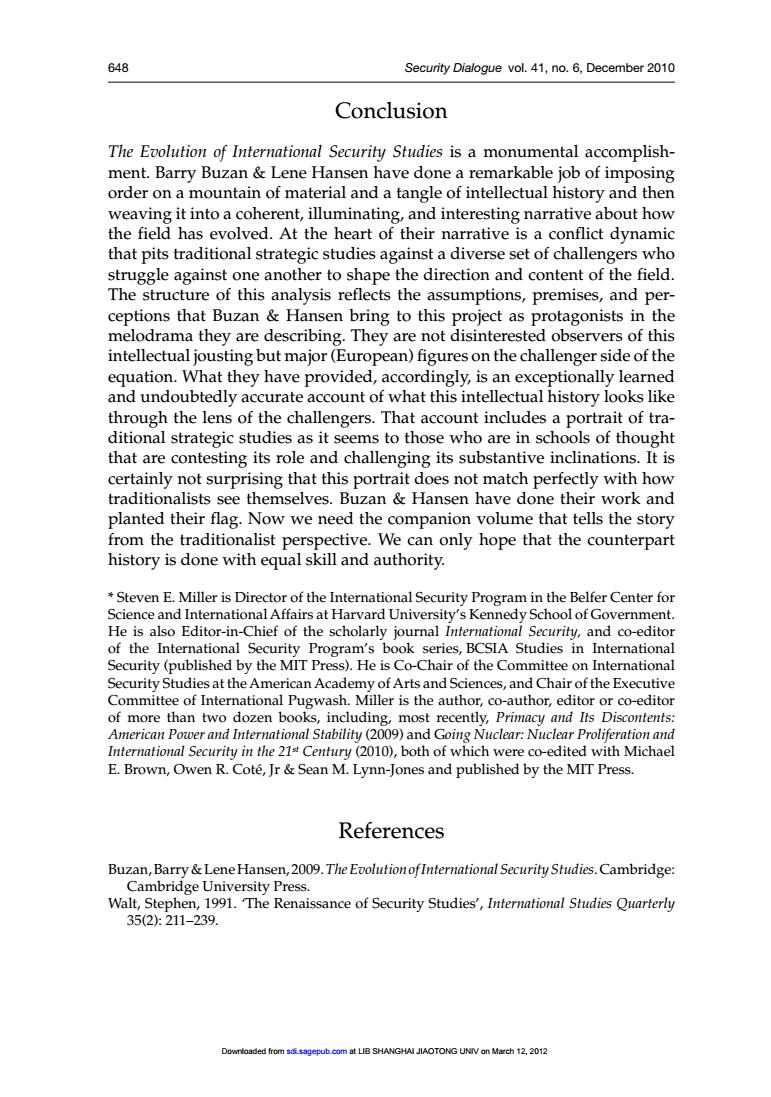正在加载图片...

648 Security Dialogue vol.41,no.6,December 2010 Conclusion The Evolution of International Security Studies is a monumental accomplish- ment.Barry Buzan Lene Hansen have done a remarkable job of imposing order on a mountain of material and a tangle of intellectual history and then weaving it into a coherent,illuminating,and interesting narrative about how the field has evolved.At the heart of their narrative is a conflict dynamic that pits traditional strategic studies against a diverse set of challengers who struggle against one another to shape the direction and content of the field. The structure of this analysis reflects the assumptions,premises,and per- ceptions that Buzan Hansen bring to this project as protagonists in the melodrama they are describing.They are not disinterested observers of this intellectual jousting but major(European)figures on the challenger side of the equation.What they have provided,accordingly,is an exceptionally learned and undoubtedly accurate account of what this intellectual history looks like through the lens of the challengers.That account includes a portrait of tra- ditional strategic studies as it seems to those who are in schools of thought that are contesting its role and challenging its substantive inclinations.It is certainly not surprising that this portrait does not match perfectly with how traditionalists see themselves.Buzan Hansen have done their work and planted their flag.Now we need the companion volume that tells the story from the traditionalist perspective.We can only hope that the counterpart history is done with equal skill and authority. Steven E.Miller is Director of the International Security Program in the Belfer Center for Science and International Affairs at Harvard University's Kennedy School of Government. He is also Editor-in-Chief of the scholarly journal International Security,and co-editor of the International Security Program's book series,BCSIA Studies in International Security (published by the MIT Press).He is Co-Chair of the Committee on International Security Studies at the American Academy of Arts and Sciences,and Chair of the Executive Committee of International Pugwash.Miller is the author,co-author,editor or co-editor of more than two dozen books,including,most recently,Primacy and Its Discontents: American Power and International Stability(2009)and Going Nuclear:Nuclear Proliferation and International Security in the 21*Century (2010),both of which were co-edited with Michael E.Brown,Owen R.Cote,Jr Sean M.Lynn-Jones and published by the MIT Press. References Buzan,Barry Lene Hansen,2009.The Evolution ofInternational Security Studies.Cambridge: Cambridge University Press. Walt,Stephen,1991.The Renaissance of Security Studies',International Studies Quarterly 35(2:211-239. Downloaded from sdi.sagepub.com at LIB SHANGHAI JIAOTONG UNIV on March 12,2012648 Security Dialogue vol. 41, no. 6, December 2010 Conclusion The Evolution of International Security Studies is a monumental accomplishment. Barry Buzan & Lene Hansen have done a remarkable job of imposing order on a mountain of material and a tangle of intellectual history and then weaving it into a coherent, illuminating, and interesting narrative about how the field has evolved. At the heart of their narrative is a conflict dynamic that pits traditional strategic studies against a diverse set of challengers who struggle against one another to shape the direction and content of the field. The structure of this analysis reflects the assumptions, premises, and perceptions that Buzan & Hansen bring to this project as protagonists in the melodrama they are describing. They are not disinterested observers of this intellectual jousting but major (European) figures on the challenger side of the equation. What they have provided, accordingly, is an exceptionally learned and undoubtedly accurate account of what this intellectual history looks like through the lens of the challengers. That account includes a portrait of traditional strategic studies as it seems to those who are in schools of thought that are contesting its role and challenging its substantive inclinations. It is certainly not surprising that this portrait does not match perfectly with how traditionalists see themselves. Buzan & Hansen have done their work and planted their flag. Now we need the companion volume that tells the story from the traditionalist perspective. We can only hope that the counterpart history is done with equal skill and authority. * Steven E. Miller is Director of the International Security Program in the Belfer Center for Science and International Affairs at Harvard University’s Kennedy School of Government. He is also Editor-in-Chief of the scholarly journal International Security, and co-editor of the International Security Program’s book series, BCSIA Studies in International Security (published by the MIT Press). He is Co-Chair of the Committee on International Security Studies at the American Academy of Arts and Sciences, and Chair of the Executive Committee of International Pugwash. Miller is the author, co-author, editor or co-editor of more than two dozen books, including, most recently, Primacy and Its Discontents: American Power and International Stability (2009) and Going Nuclear: Nuclear Proliferation and International Security in the 21st Century (2010), both of which were co-edited with Michael E. Brown, Owen R. Coté, Jr & Sean M. Lynn-Jones and published by the MIT Press. References Buzan, Barry & Lene Hansen, 2009. The Evolution of International Security Studies. Cambridge: Cambridge University Press. Walt, Stephen, 1991. ‘The Renaissance of Security Studies’, International Studies Quarterly 35(2): 211–239. Downloaded from sdi.sagepub.com at LIB SHANGHAI JIAOTONG UNIV on March 12, 2012